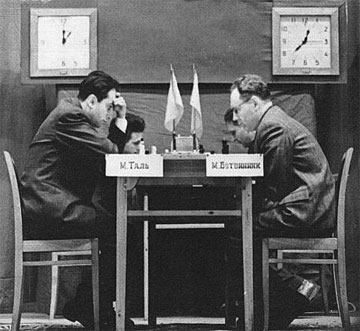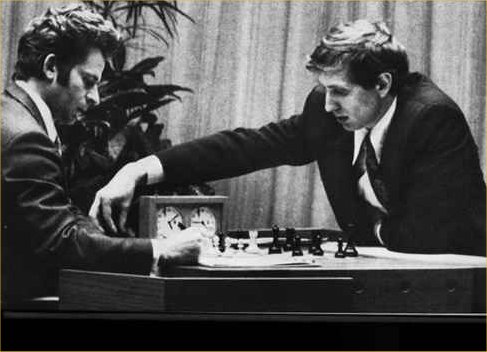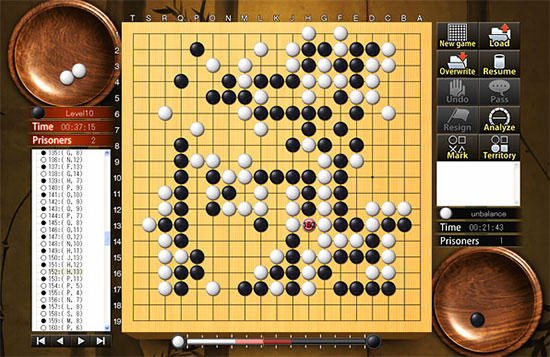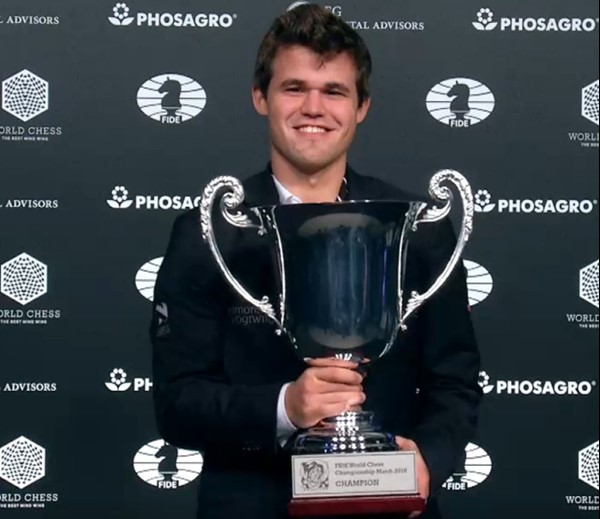
Yasser Seirawan (Photo: David Llada)
A Radical Solution Final Thoughts
Dear ChessBase readers, dear chess fans,
I really must beg for your indulgence. When I wrote my original article, “A Radical Solution,” it was a knee-jerk rant of sorts. Reeling from the “thirty-five-minute punch,” of Game 12 in the World Championship Match (WCM) was simply too much of a disappointment for me to bear. With the whole world tuning in to watch a dramatic final game of a competitive sporting duel we witnessed instead a dud masquerading as a classical game, leaving me greatly annoyed. The players can’t be faulted - it was the match rules that were to blame.

After 30 moves and 35 minutes Magnus Carlsen and Sergey Karjakin
agreed to a draw in game 12 of their World Championship match.
Okay, one rant is fine, a second is pushing the boundary of fine etiquette and a third is well-and-truly over the top. Agreed. Hence my request for your kind indulgence as I genuinely find the issue to be far too important to pass over as things currently stand. Let’s get started.
Firstly, a very big thank you to both GM Emil Sutovsky and GM Maurice Ashley for contributing with their articles about the format as well as proposed changes to the WCM rules and regulations. Feedback on this vital topic is much needed. If both “market forces” and “the evolution of the game” are contrary to what I propose, that will be that, and my angst will quickly be buried by the sands of time. That said, please allow me to share some final thoughts on this crucial topic.
To sum up...
To sum up my views, as elaborated in my previous articles:
1. The WCM is the crown jewel of the chess world. We should aspire to a system that allows for matches like Botvinnik-Tal (1960) and Spassky-Fischer (1972), which inspired generations of chess players, including me.

Mikhail Tal vs Mikhail Botvinnik
2. Chess has one of the richest histories of any sport in the world. We should be proud of this history, and respecting the WCM rules both honors past World Champions and ensures the future of chess.
3. Chess should not give in to the fast-paced, modern age world of near science fiction that we colloquially call the “information age.” Chess cannot compete with the limited attention spans that Hollywood and other societal forces have capped at ninety minutes to two hours for movies, three hours for sporting events, and less for other things, such as political discourse. I don’t accept that to keep up we must play faster (!), decrease the number of games played (!) and force a result (!) by the time our nightly news source is uploaded, and that failing to do so means the extinction of our beloved sport.
Really? Are these the challenges that we face? To save our crown jewel we must change it beyond all recognition? Perhaps I’m merely having a bad period or simply exaggerating the challenges we face? That in fact while things may not be perfect with our WCM and cycle system they are reasonably fine. I think not.
4. I’m highly critical of the entire existing World Championship cycle, although I’m aware that my dislike of the cycle won’t change anything.
Which brings us to the WCM itself. My fundamental position is that the WCM should consist of classical games only, and that Rapid and Blitz should not be used to break a tied match.
My friend PCA President Emil Sutovsky proposed playing a Rapid/Blitz chess tiebreaker before the Classical games even begin. This creative idea ensures that a Rapid/Blitz tiebreak would be part of every WCM, not just tied ones. Since I don’t think Rapid/Blitz games should ever be part of a WCM, tied or not, I have to respectfully disagree with Emil’s proposal.
Maurice Ashley’s article reported the views of the world’s elite players on the current WCM regulations and the role of tiebreaks featuring Rapid and Blitz chess. I don’t question the accuracy of his article (that the vast majority of the world’s elite players are “okay” to “fine” to “supportive” of the current system (2016). I would be surprised if it were otherwise - it is difficult to compete at the highest levels of chess while questioning the legitimacy of the way chess is organized.
So where do I stand on all of this?
A. The WCM is too short
The WCM should not be a twelve-game contest. Twelve games are not enough.
The realities of the world today are such that a 24-game match is simply not going to happen. I get that. I suggest 16 games, as a compromise (but read on).
Placing our crown jewel in context: a month from now the second longest running traditional tournament in the world after Hastings, the 79th Tata Steel tournament, will be held in Wijk Aan Zee, Holland.

The sea in Wijk aan Zee
It will be a 13-round (game) event. It has not bowed to the demands of being shorter, faster and quicker to be “better”. Tradition still counts for something. The Candidate’s Tournament, the prelude to the WCM, is a 14-game event. Not Zurich 1953 by any stretch, but still long enough to get a worthy Challenger. Yet the WCM is shorter than these and other events, and is considerably diminished by these comparisons.
The argument that WCM organizers prefer a shorter (12-game) match doesn’t hold water. The additional costs of a longer match, in percentage terms, are not significantly higher and the extra games in fact can be very helpful to the organizers, as publicity builds and ticket sales increase as the match reaches its zenith.
All credit to Maurice Ashley for sharing the very strong criticisms from the 12th World Champion Anatoly Karpov, whose views of the current WCM format were positively dismissive. No longer being a potential participant in a WCM, Tolya could take a longer-term view than the current top players:
“…12 games is not that mockery on chess we observed during the knock-out system - but it is still not enough. At least 14-18 games are needed for full-fledged, creative fight: then the rivals have an ability to risk; whilst in a short match of the rivals whose strength is equal, the game is usually just hold, while the opponents are just trying to catch "a fail-safe chance." ... “I'm firmly against of mixing different forms of chess. Determining the Classical World Chess Champion in rapid, and all the more, in blitz is just nonsense."
http://chess-news.ru/en/node/8423
Furthermore, let me boldly state the obvious: the 12-game WCM of today is no longer an epoch-making, world-defining sporting event that holds the chess world enthralled. The WCM no longer stands out as the ultimate pinnacle of intellectual excellence. It is simply too short, both in absolute terms and in comparison to other events, including some national championships.
B. The World Championship title is losing prestige
Some of the feedback from readers after my two previous articles included opinions such as “why bother with a WCM? We have a rating system that tells us who is the best in the world.” and “neither tennis or golf have a world champion; we don’t need one either.” When chess fans express such sentiments, it is the severest of warnings.
The chess world is fortunate, because Magnus Carlsen, the current World Champion, is also the highest rated player in the world and no one can question the legitimacy of his status as the planet’s top player.

Magnus Carlsen after winning the strong open in Qatar 2015
But it is quite conceivable that the World Champion may not be the highest rated player in the world and it would be bad for chess if the rating system became more important than the title. This was foreshadowed in the mid-sixties, when Tigran Petrosian won, then defended, the World Championship title, despite some mediocre tournament results. But no one questioned the importance of the World Championship title - if someone was really better, a 24-game match was there to prove it (and Spassky did in 1969).
If one wishes to quantify this problem, consider that the prize fund for the Carlsen-Anand match in Chennai, India in 2013 was 2,650,000 Euros. The prize fund for the 2014 match was much less at two million Euros, and may in fact have actually been only one million Euros. The 2016 prize fund was the minimum one million Euros or rather $1,060,000 USD. The smallest prize fund of the 21st century for WCM’s. Is this rapidly shrinking prize money due to “market forces” or is the WCM simply no longer the prestigious event it once was?
C. These developments are not coincidental or inevitable
To recap my concerns: the WCM as an event shorter in length than ever before; it is shorter than the Candidates tournament that precedes it, as well as other events; it isn’t even close to the intellectual challenge it once was, because it doesn’t allow a full-fledged creative fight (Anatoly Karpov); the WCM is seeing steadily diminishing prize funds.
Throughout my career as a chess professional I’ve heard frequent laments of how chess does not get enough main-stream media coverage; television has ignored our sport more or less completely (excepting Norway); sponsors are not lining up to create great events because we don’t get enough exposure; chess columns are losing precious inches or being discontinued altogether.
The solution, so I’ve been told, is that if only we could get the spotlight of the world to shine its attention on our noble sport we would be discovered and chess would be transformed, as it was in 1972.

Fischer vs Spassky, Reykjavik 1972
We just need a golden break. What better place than the financial and media capital of the United States, New York City? Queue drumroll please, may I present Game 12 of the match. Trip, stumble, fall, splat. That was so comically disastrous I can now look back and laugh. If that represents our best effort while capturing the world’s attention I’ll have to rediscover checkers. I’m told it is challenging.
We cannot set ourselves up again for such a tragic fall. We cannot have a repeat of Game 12. As an ardent chess fan I cringe at the impact on potential sponsors. We simply have to do better in the future.
D. My proposal
Limiting myself only to the rules and regulations of the WCM I’d like to offer a clear, no-nonsense, proposal for the 2018 WCM that builds on my previous two articles.
While I was quite pleased with my original proposed solutions for improving the WCM, it was greatly enhanced by exchanges I had with my dear friend, Bruce Harper (fellow co-author and co-inventor of “S-Chess” - which is another topic altogether). I’ll let his own words speak to his suggestion, which I adopt:
“I get the concept that you unbalance the score from the start, so a drawn match is not mathematically possible. This is done in Go, where the “komi” (handicap) is, I believe, now normally set at 5.5 stones. This is based on the assessment that the first move in Go is worth something like 5 points, but by including a half point in the komi, a tie is not possible (since the actions of the players can only be measured in full points). So if the game is close, one side or the other will win by .5 points, but someone will win.

No draw in Go (Screenshot of Crazy Stone, distributed by Unbalance)
Your idea is essentially to introduce a komi into the WCM … Who gets the komi is random (under your proposal), and the other player gets one extra White in compensation (although it is not full compensation).
Where I suspect the proposal could be improved is in deciding which player gets the advantage of the komi (which is greater than the advantage of the extra White). Drawing lots strikes me as unsatisfying, when one player has the accomplishment of winning (and possibly retaining) the World Championship title, and the other has the accomplishment of emerging from the Challenger system. On the theory that the Champion must be defeated for the Challenger to win the title, it might be better to just say:
a. Play a 17-game match.
b. The Challenger gets the extra White.
c. The Champion retains the title in the event of a tie.
d. The Challenger chooses when to play the extra White game.
I added d. because we know that the extra White is worth less than the draw odds in the match. So it seems appropriate to enhance the value of the extra White by giving the Challenger the power to determine when that game is played. Some notice would have to be given, which would be something like within one hour of the end of the previous game or by 8:00 pm on the day of the previous game.
This would mean that the Challenger would always have two White’s in a row. But the Challenger would determine when he or she would get two Whites in a row, which is better than either getting the extra White out of the way at the start or deferring it to the end. I think from the spectator point of view it would be more interesting as well.”
As Mr. Harper makes clear, and I agree with him, the draw-odds advantage in favor of the Champion is greater than the benefit of the Challenger having an extra White. The chances of winning with White are slightly greater than with Black, but a win is certainly not guaranteed! However, giving the Challenger the flexibility of when to play the extra White game is quite a benefit as well. And it definitely spices things up.
Tradition is served by having the Champion retain the title in the event of a drawn match - to be the best, you have to beat the best. No Rapid or Blitz tie breaks. Just one extra White for the Challenger, to be used as the Challenger sees fit. When the Challenger makes his or her push with the extra White, the chess world will take notice, and the Champion’s advantage of “draw odds” will be somewhat balanced.
While there is no perfect system, given the pressures of our modern-day realities, I strongly believe these proposed changes will help restore the luster of our crown jewel and would urge the FIDE to adopt them for the 2018 WCM.

Magnus Carlsen with the "Crown Jewel" of chess































